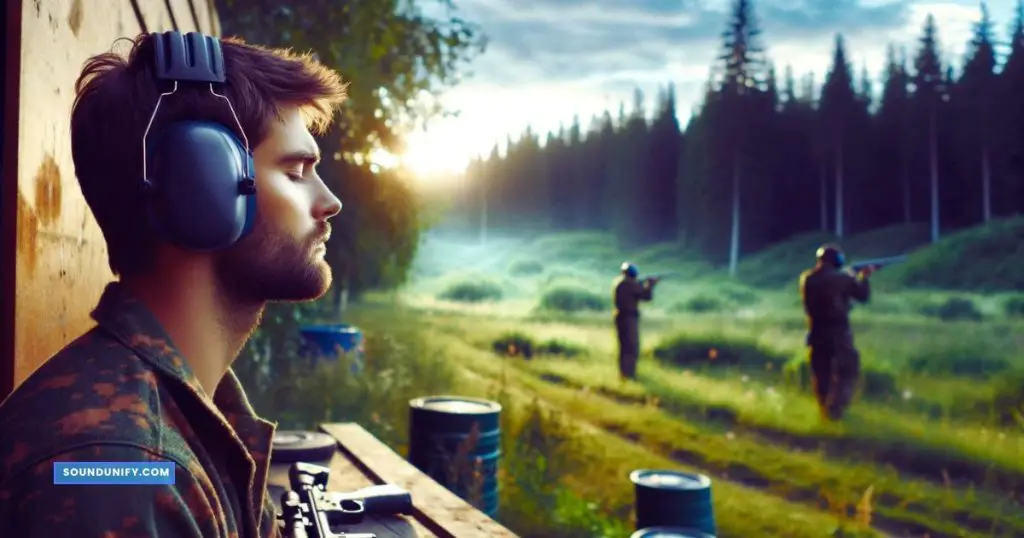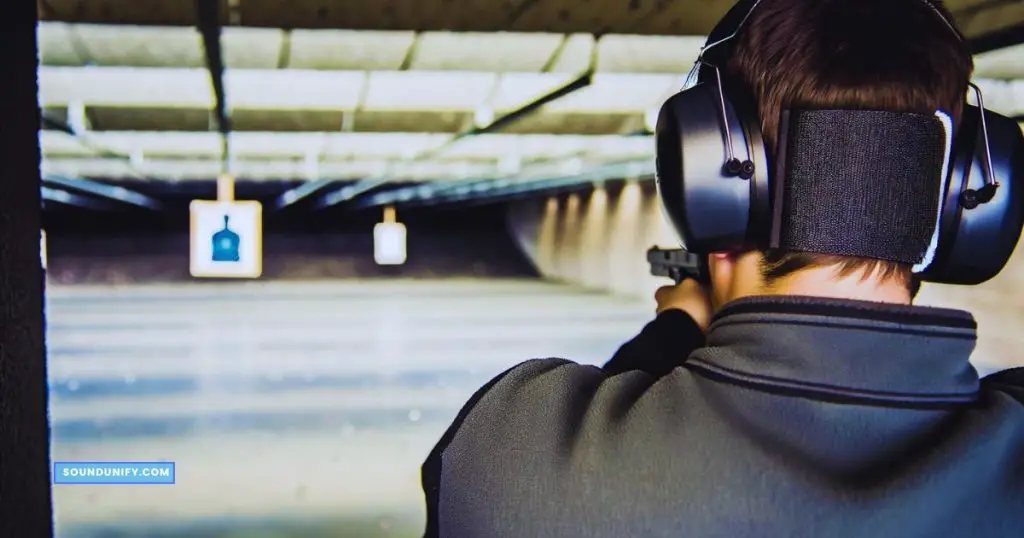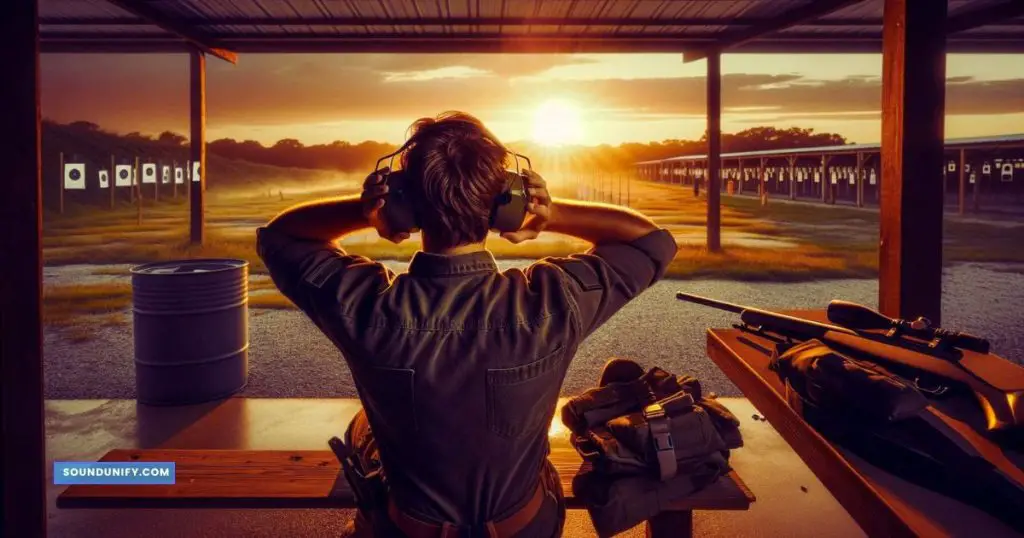Yes, noise-cancelling headphones are an excellent tool for gun shooting enthusiasts who need to protect their ears from loud sounds.
When it comes to shooting, whether at the range or out in the field, the roar of gunfire isn’t just exhilarating. It’s potentially harmful to your ears. Hearing protection is not just an accessory; it’s an absolute necessity.
Amidst the vast array of options, noise-cancelling headphones emerge as a beacon of innovation and protection, blending technology with safety to offer shooters an effective means to shield their hearing.
Noise-cancelling headphones, with their advanced capabilities, are more than just a way to enjoy music without the interference of background noise. They represent a critical tool for anyone involved in shooting activities.
These devices come in two flavors: passive and active noise cancellation, each designed to mitigate the harsh sounds of gunfire, thus protecting your hearing.
With their relevance to shooting growing, it’s essential to dive deeper into how these headphones work and determine whether they are the right choice for your shooting needs.
In this exploration, we’ll unravel the mechanics behind noise-cancelling headphones and dissect their role in the shooting domain, ensuring your ears remain safeguarded against the potentially deafening blasts of firearms.
Let’s embark on this journey with a precise aim: to keep our hearing sharp so we can continue to enjoy the sounds of life beyond the range.
Definition and Types of Noise Cancelling Headphones

In the realm of hearing protection and audio clarity, noise-cancelling headphones stand out for their sophisticated approach to sound management. These devices are ingeniously designed to reduce or eliminate unwanted ambient sounds using two leading technologies: passive and active noise cancellation.
- Passive Noise Cancelling Headphones (PNC) rely on the physical materials from which they are made, such as high-density foam and tightly sealed ear cups, to block out sound. Think of them as the fortress walls shielding your ears from the chaotic noise of the outside world.
- On the other hand, active Noise Cancelling Headphones (ANC) are the wizards of the headphone world. They create sound waves that mirror the external noise but are inverted (180 degrees out of phase). This “anti-noise” effectively cancels the background din, creating a serene audio environment.
How Do Noise Cancelling Headphones Work?
The magic behind PNC and ANC headphones lies in their unique approaches to silencing the world:
- PNC headphones act as a barrier, physically blocking and absorbing sound waves. Imagine wearing a helmet in a bustling marketplace; the sounds are muffled and quieter because the helmet (like PNC headphones) prevents the noise from reaching your ears directly.
- ANC headphones take a more proactive approach. They listen to the environment with built-in microphones, generate a mirror image of the noise, and play this “anti-noise” through the speakers, erasing unwanted sounds before they reach your ears. It’s like having a personal audio filter tailored to remove the specific frequencies of noise surrounding you.
Comparing Noise Cancelling Headphones to Custom Hearing Protection
| Feature | Noise Cancelling Headphones (ANC) | Custom Hearing Protection |
|---|---|---|
| Versatility | High adaptability to varying noise levels, ideal for dynamic environments. | Less versatile, primarily designed for consistent, high-noise environments. |
| Purpose | Dual-purpose: protects hearing and delivers high-quality audio for music and communication. | Single-purpose: optimized for hearing protection with superior noise isolation. |
| Technology | Utilizes active noise cancellation to target and cancel out certain noises while allowing others specifically. | Lacks active noise-cancelling technology, relying on passive protection to block out sound. |
| Custom Fit | Standard fit may not perfectly conform to all ear shapes. | It is tailored to the individual’s ears for unmatched comfort and noise isolation. |
| Passive Protection | Offers some level of passive noise isolation in addition to active noise cancellation. | Superior passive protection, especially adequate in extremely loud environments. |
| Battery Dependency | Requires batteries or charging, which can limit their usage over extended periods without access to power. | No batteries are required, offering reliability and continuous protection without recharging. |
| Adaptive Technology | Yes, I can adjust to different noise environments and types of sound for a personalized listening experience. | No, it offers a consistent level of noise reduction without the ability to adapt to varying sound types. |
| Multimedia Use | Yes, it is designed for multimedia consumption alongside hearing protection. | No, it focuses solely on hearing protection without multimedia capabilities. |
Can You Shoot Guns with Noise-Cancelling Headphones?

The short answer is yes but with nuances. Firearms produce noise levels well above 140 dB, far surpassing the threshold for potential hearing damage, which starts at just 85 dB.
Passive Noise Cancelling (PNC) headphones can provide substantial protection by physically blocking some of this sound. Active Noise Cancelling (ANC) headphones play a more complex role.
While they excel at reducing consistent, low-frequency background noise, the sudden, high-decibel blast of a gunshot may not be fully canceled out due to the instantaneous nature of these sounds.
That said, high-end ANC headphones are designed to dampen sudden noises quickly, making them suitable for shooting environments.
However, it’s crucial to understand that not all ANC headphones are created equal, especially when protecting against the sharp report of gunfire.
Benefits of Using Noise Cancelling Headphones for Shooting
- Enhanced Focus: Shooters can concentrate better on their targets and instructions by reducing background noise, potentially improving accuracy and safety.
- Protection: Both PNC and ANC headphones can significantly reduce noise exposure, protecting shooters from hearing loss over time.
- Versatility: ANC headphones can be especially beneficial in dynamic environments where background noise varies, such as outdoor ranges or hunting grounds. They allow shooters to remain alert to their surroundings while still protecting their ears from the harmful effects of gunshots.
For instance, a shooter at an outdoor range might use ANC headphones to minimize distractions from wind, conversation, or distant sounds, creating a more focused shooting experience.
Similarly, hunters can benefit from ANC headphones to stay aware of their environment while protecting their hearing from the sound of their rifles.
Potential Drawbacks and Considerations
While noise-cancelling headphones offer several advantages for shooters, there are scenarios where they might not be the ideal choice:
- Instantaneous Noises: The rapid onset of gunshot noise can be challenging for some ANC technology to counteract effectively.
- Battery Dependency: ANC headphones require power to function, meaning they could run out of battery at an inopportune moment.
- Cost: High-quality ANC headphones effective in shooting environments can be expensive.
Alternatives to consider include:
- Traditional Ear Protection: Earmuffs and earplugs explicitly designed for shooting sports offer robust noise reduction capabilities and are not dependent on batteries.
- Electronic Shooting Earmuffs: These devices amplify ambient sounds like speech while automatically blocking hazardous noise from gunshots. They provide a balance between protection and situational awareness.
Practical Insights for Shooters

Selecting the right time and place for using noise-cancelling headphones can optimize your shooting experience while ensuring your hearing remains protected. Here are some guidelines:
- Indoor Ranges: These environments often have controlled noise levels where ANC headphones can effectively reduce the reverberation of gunshots, making them a good choice for both protection and concentration.
- Outdoor Ranges and Hunting: In scenarios where ambient noise varies, ANC headphones can help shooters maintain awareness of their surroundings by filtering background noise while offering protection against gunfire.
- Instructional Settings: When learning or teaching, ANC headphones can help maintain clear communication by reducing distracting noises, allowing for better focus on instructions and safety protocols.
It’s crucial, however, to ensure that the headphones you choose can handle the specific noise levels encountered in shooting activities and do not hinder situational awareness.
Alternatives to Noise Cancelling Headphones
While noise-cancelling headphones offer many benefits, other hearing protection options might be more suitable for specific shooting scenarios:
- Passive Earmuffs: These provide a high level of noise reduction by physically sealing off the ears and are reliable for any shooting environment, especially where battery life is a concern.
- Electronic Earmuffs: Combining the best of both worlds, electronic earmuffs protect against loud sounds while amplifying normal conversation and environmental noises. They’re ideal for both indoor and outdoor shooting ranges.
- Earplugs: For those who prefer a lighter, more inconspicuous option, earplugs can offer significant protection, although they may not provide the same level of comfort or noise filtration as earmuffs.
Tips for Choosing the Right Hearing Protection
Choosing the correct hearing protection is critical for both safety and enjoyment. Consider the following factors:
- Noise Reduction Rating (NRR): Look for devices with a high NRR to ensure maximum protection against the loud noise of gunshots.
- Comfort: Since shooting sessions can last several hours, opt for headphones or comfortable earmuffs over long periods.
- Durability: High-quality materials and construction mean your hearing protection will withstand the rigors of shooting environments.
- Battery Life: If choosing ANC headphones or electronic earmuffs, ensure they have a long battery life or easy recharging options to avoid unprotected.
- Situational Awareness: Essential for hunters or those shooting in dynamic environments, select hearing protection that doesn’t completely isolate you from your surroundings.
By considering these guidelines, shooters can make informed decisions about their hearing protection, balancing noise reduction with the desire for comfort, awareness, and communication.
Remember, the right choice protects your hearing and enhances your overall shooting experience.
The Importance of Hearing Protection in Shooting

The crack of a gunshot is not just a sound. It’s a shockwave, capable of causing immediate and lasting damage to your hearing.
Exposure to noise levels above 85 decibels (dB) can lead to hearing loss, and the sound of a gunshot can easily exceed 140 dB. This isn’t just about discomfort but preventing irreversible harm to your ears.
Hearing protection while shooting isn’t optional; it’s essential for safeguarding one of your most precious senses.
Continuous exposure to the loud noise of gunfire without adequate protection can lead to Noise-Induced Hearing Loss (NIHL), a permanent condition that can affect your quality of life.
Moreover, the importance of hearing protection extends beyond just preventing hearing loss.
It’s about preserving your ability to communicate effectively, enjoy the sounds of everyday life, and stay connected to the world around you.
Consequences of Neglecting Ear Protection at Shooting Ranges
Neglecting ear protection in environments as loud as shooting ranges can have profound, long-term implications for your hearing health:
- Immediate and Permanent Hearing Loss: The intense sound of gunfire can damage the delicate structures within the ear, leading to permanent hearing loss that cannot be reversed.
- Tinnitus: Many shooters experience ringing in their ears after exposure to loud gunfire. This condition, known as tinnitus, can be temporary or become a chronic, distressing presence, significantly impacting one’s quality of life.
- Hyperacusis: This condition involves an increased sensitivity to everyday sounds, which can be painful or highly uncomfortable. It can develop after repeated exposure to loud noises without proper ear protection.
- Psychological Effects: Beyond the physical effects, hearing loss and tinnitus can lead to social isolation, frustration, and depression as communication becomes more challenging.
The health risks of neglecting ear protection are not to be taken lightly. The consequences extend far beyond the shooting range, affecting every aspect of a person’s life.
It’s a stark reminder that shooting can be a rewarding sport and a valuable skill. It comes with responsibilities to your safety, your health, and the well-being of those around you.
FAQ Section
Can noise-cancelling headphones fully protect my ears from gunshot noise?
While noise-cancelling headphones, especially those with active noise cancellation (ANC), can significantly reduce the impact of gunfire noise, they may not fully protect your ears from highly high-decibel gunshots. Choosing headphones designed for shooting or using them in conjunction with other hearing protection methods is essential for optimal safety.
Are there any noise-cancelling headphones specifically designed for shooting?
Yes, there are headphones and electronic earmuffs designed with shooters in mind. These devices combine noise-cancellation technologies with features tailored to shooting environments, such as amplifying low-level sounds for better communication and situational awareness.
Can I use regular consumer ANC headphones for shooting?
While consumer ANC headphones can reduce background noise, they’re not specifically designed to handle gunshots’ sudden, high-decibel sound. It’s advisable to use hearing protection devices to protect against the specific types of noise encountered in shooting sports.
How do I choose between passive and active noise-cancelling headphones for shooting?
Consider the environment in which you’ll be shooting and your specific needs. Passive noise-cancelling headphones are generally more effective at blocking out all external sounds, including sudden, loud noises like gunshots. Active noise-cancelling headphones are better suited for consistent, low-level background noise environments. Still, they may not be as effective against the sharp sounds of gunfire without additional protection features.
Can wear noise-cancelling headphones while shooting affects my situational awareness?
Yes, depending on the type and settings of the headphones. Some shooting-specific headphones and electronic earmuffs are designed to enhance situational awareness by amplifying speech and environmental sounds while blocking harmful noise levels. Selecting a model that balances protection with the ability to stay aware of your surroundings is crucial.
Conclusion
Throughout our exploration, we’ve unpacked the essentials of hearing protection in shooting, distinguishing between passive and active noise cancellation and evaluating their efficacy alongside custom hearing protection. Here are the takeaways:
- Noise Cancelling Technologies: Understanding the mechanics of passive and active noise cancellation is crucial for choosing suitable hearing protection.
- Custom Hearing Protection: Offers a tailored fit, providing superior noise isolation in boisterous environments.
- Choosing the Right Protection: The environment and specific needs dictate the best type of hearing protection, whether it’s for an indoor range, outdoor shooting, or hunting.
- Health Risks: Prolonged exposure to gunfire noise can lead to permanent hearing loss and tinnitus, underscoring the necessity of proper ear protection.
- Call to Action: Prioritize hearing health by selecting the most appropriate hearing protection, ensuring it’s worn consistently to safeguard against the risks of shooting activities.
Hearing protection transcends being a mere accessory, a cornerstone of safe shooting practices. The ultimate aim is to relish shooting sports while diligently protecting our hearing, thereby preserving our ability to enjoy life’s sounds for the future. Make hearing protection a staple of your shooting regimen for the sport’s sake and well-being.
James Dimento is a Chief-in-Editor of SoundUnify. He is a headphone enthusiast and creative writer passionate about audio technology. He has three years of experience writing about headphones and sound quality and is responsible for creating reviews and taking care of all administration.
